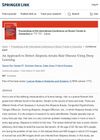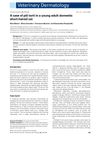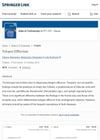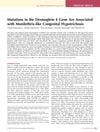 2 citations,
March 2021 in “Journal of Cosmetic Dermatology”
2 citations,
March 2021 in “Journal of Cosmetic Dermatology” Umbilical cord-derived media is safe and effective for hair growth.
June 2013 in “International Journal of Dermatology” Central lipohypertrophy in HIV-infected women may lead to shorter eyelashes.
 10 citations,
November 2022 in “Protein & Cell”
10 citations,
November 2022 in “Protein & Cell” Quercetin significantly helps hair growth by activating hair follicles and improving blood vessel formation around them.
 January 2021 in “Lecture notes in networks and systems”
January 2021 in “Lecture notes in networks and systems” Deep learning can accurately detect Alopecia Areata with up to 98.3% accuracy.
January 2002 in “Hair transplant forum international” Finasteride reduces hair follicle cell death in androgenetic alopecia.
 6 citations,
February 2022 in “Journal of immunology research”
6 citations,
February 2022 in “Journal of immunology research” Exosomes from fat-derived stem cells can potentially improve hair growth and could be a new treatment for immune-related hair loss.
 53 citations,
October 2012 in “The FASEB Journal”
53 citations,
October 2012 in “The FASEB Journal” Bimatoprost, a glaucoma medication, may also help treat hair loss.
 August 2024 in “Quality in Sport”
August 2024 in “Quality in Sport” New treatments for common hair loss are needed.
 11 citations,
January 2001 in “Cambridge University Press eBooks”
11 citations,
January 2001 in “Cambridge University Press eBooks” Androgens can cause hair growth in some areas but hair loss on the scalp.
 2 citations,
March 2020 in “International Journal of Molecular Sciences”
2 citations,
March 2020 in “International Journal of Molecular Sciences” Topical treatments can deliver active molecules to skin stem cells, potentially helping treat skin and hair disorders, including skin cancers and hair loss.
 5 citations,
March 2017 in “Laser Physics Letters”
5 citations,
March 2017 in “Laser Physics Letters” Different scalp imaging methods are important for studying hair and scalp health and require more volunteers for better evaluation.
2 citations,
November 2022 in “Oxidative Medicine and Cellular Longevity” Exosomes from dermal papilla cells help hair follicle stem cells grow and survive.
 1 citations,
April 2023 in “Biomaterials advances”
1 citations,
April 2023 in “Biomaterials advances” Gellan gum hydrogels help recreate the environment needed for hair growth cell function.
 6 citations,
February 2013 in “Veterinary Dermatology”
6 citations,
February 2013 in “Veterinary Dermatology” A young cat had a rare hair condition with twisted hair shafts but stayed healthy.
 April 2018 in “Journal of Investigative Dermatology”
April 2018 in “Journal of Investigative Dermatology” Hair pattern in androgenetic alopecia overlaps with scalp and bone demarcations, with distinct gene profiles affecting susceptibility.
 November 2005 in “Journal of Investigative Dermatology Symposium Proceedings”
November 2005 in “Journal of Investigative Dermatology Symposium Proceedings” The 2004 hair research meeting presented new findings on hair cell differentiation, genetic factors in hair loss, hair pigmentation, and potential targeted therapies.
 7 citations,
November 2013 in “Pediatric and Developmental Pathology”
7 citations,
November 2013 in “Pediatric and Developmental Pathology” Over half of the children had abnormal hair under a microscope, with many having genetic hair conditions.
 6 citations,
January 2010 in “Springer eBooks”
6 citations,
January 2010 in “Springer eBooks” SA linked to mitochondrial issues and oxidative stress, while AGA involves disrupted hair growth genes.
2 citations,
July 2021 in “Genes” A specific genetic change in the KRT71 gene causes a hair loss condition in Hereford cattle.
35 citations,
August 2009 in “Differentiation” Desmoglein 4 is controlled by specific proteins that affect hair growth.
 6 citations,
January 2012 in “Springer eBooks”
6 citations,
January 2012 in “Springer eBooks” Trichoscopy is not specific for diagnosing telogen effluvium and both telogen effluvium and androgenetic alopecia often occur together.
 22 citations,
June 2012 in “PLOS ONE”
22 citations,
June 2012 in “PLOS ONE” Cholesterol-related compounds can stop hair growth and cause inflammation in a type of scarring hair loss.
7 citations,
August 2020 in “Genes” Different genes are active in dogs' hair growth and skin, similar to humans, which helps understand dog skin and hair diseases and can relate to human conditions.
 49 citations,
January 2003 in “American Journal of Clinical Dermatology”
49 citations,
January 2003 in “American Journal of Clinical Dermatology” Effective management of children's hair loss involves accurate diagnosis, various treatments, and supportive care.
 6 citations,
August 1993 in “Archives of Dermatology”
6 citations,
August 1993 in “Archives of Dermatology” A woman's hair changed to a dry, tangled texture that's hard to comb after treatment with spironolactone, suggesting the medication might cause such hair changes.
 July 2017 in “British Journal of Dermatology”
July 2017 in “British Journal of Dermatology” The document concludes that scalp conditions have various causes and can present in many different ways.
 74 citations,
January 2006 in “The journal of investigative dermatology/Journal of investigative dermatology”
74 citations,
January 2006 in “The journal of investigative dermatology/Journal of investigative dermatology” Mutations in the DSG4 gene can cause a rare hair disorder similar to monilethrix.
 January 2024 in “ACS Biomaterials Science & Engineering”
January 2024 in “ACS Biomaterials Science & Engineering” A new method using a microfluidic device can prepare hair follicle germs efficiently for potential use in hair loss treatments.
 1 citations,
September 2022 in “Journal of dermatological science”
1 citations,
September 2022 in “Journal of dermatological science” Certain vitamins and their derivatives can help hair grow longer by activating specific growth signals.
 74 citations,
January 2013 in “Expert Opinion on Biological Therapy”
74 citations,
January 2013 in “Expert Opinion on Biological Therapy” The conclusion is that hair growth can be improved by activating hair cycles, changing the surrounding environment, healing wounds to create new hair follicles, and using stem cell technology.
























